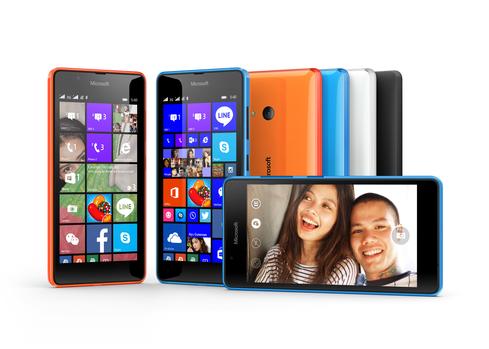Nokia Wants Another Run At Making PhonesNokia Wants Another Run At Making Phones
Nokia looks to regain relevancy in the mobile device business in its post-Microsoft life.


5 Ways Microsoft Messed Up Mobile
5 Ways Microsoft Messed Up Mobile (Click image for larger view and slideshow.)
Nokia, once the European leader in the mobile phone industry, wants to return to making smartphones after selling its device manufacturing division to Microsoft last year.
Nokia has responded to rumors that it wants to get back to the mobile phone market, indicating that it could be possible -- but it's not sure. In the Finnish telecom giant's words, "[I]t's complicated."
For Europeans, it's difficult to see Nokia just as a telecom infrastructure company, and not one of the leading handset vendors in the market. When Nokia sold its business to Microsoft last year, Europe lost an important part of its mobile communications history.
[Microsoft will write down $7.6 billion related to its Nokia acquisition. See Office For Mac 2016, Phone Biz Layoffs: Microsoft Roundup.]
For many years, Nokia phones were a status symbol for professionals and consumers in Europe.
The company was the first to develop a digital, portable, and encrypted text-based communications device for the Finnish Defense Forces, the Sanomalaitejärjestelmä, in the 1970s. In 1987 Nokia introduced its first analog cellular phone, the Mobira Cityman 900 for NMT-900 networks, dubbed "Gorba" because Mikhail Gorbachev was pictured using one unit to call Moscow from Helsinki that year.
Nokia was also one of the leading technology companies involved in the European project for the first all-digital mobile communications system, GSM, which became the worldwide standard of second-generation (2G) cellular technology. In 2003 it launched the Nokia 1100, nicknamed "Penny," which in 2007, after shipping 200 million units, became the world's best-selling consumer product of all time.
In 2007 Nokia launched the N95, a smartphone based on the Symbian operating system that would keep Nokia the best-selling brand in Europe, in spite of Apple's launch of the first iPhone the same year. It did help that the first Apple smartphone and the BlackBerry units at the time had no 3G connectivity.
Due to the introduction of the iPhone 3G, and later of the first Android OS models, Nokia phones started to lose popularity, and its efforts to develop new models based on the Symbian OS failed to compare with the ones from Apple, BlackBerry, and Android.
The Microsoft Deal
After a bumpy ride for several years, with Symbian losing popularity due to its lack of applications, in February 2011 Nokia and Microsoft signed a major business partnership to develop smartphones based on Windows OS.
The announcement, which was supposed to be a good thing for Nokia, started a catastrophic slide, with Nokia's stock price losing about 14%. Its smartphone sales, which had previously increased, collapsed. Pierre Ferragu, an analyst with Sanford C. Bernstein in London, said, "[T]his partnership will take time to implement and deliver phones. This is what may kill Nokia."
And it did. Apple became the supplier of the most profitable smartphone on the market. Google's Android became the preferred OS for most of its competitors, including Sony and Samsung, former users of Nokia's Symbian OS.
Windows for Mobile never took off and, after trying to remain competitive by launching several lines of inexpensive Lumia units, Microsoft announced in September 2013 that it would acquire Nokia's mobile device business for $3.8 billion. The deal was finalized in April 2014, after Nokia introduced several new smartphones at Mobile World Congress, including some Android-compatible models.
Microsoft was present for the first time at MWC 2015, introducing a new line of Lumia devices, with former Nokia mobile chief Stephen Elop as the head of the new division. That division now includes products such as Xbox and the Surface lines. Then in June Microsoft announced that Elop is one of several executives who will leave the company following a transitional period.
Eyeing a Return
Now the rumors and speculation of Nokia's return to the handset market are escalating.
Back in April, when the first rumors started, the company was clear: "Nokia notes recent news reports claiming the company communicated an intention to manufacture consumer handsets out of a R&D facility in China. These reports are false, and include comments incorrectly attributed to a Nokia Networks executive. Nokia reiterates it currently has no plans to manufacture or sell consumer handsets."
But rumors continued, and on Monday, July 13, spokesperson Robert Morlino said, "[I]t's not surprising that today, the question comes up all the time: 'Will Nokia return to mobile devices?' The answer is: it's complicated." He added, "[T]o summarize, we will look for the right partner who can take on the heavy lifting and work closely with us to deliver a great product. As we agreed with Microsoft, the soonest that could happen is Q4 2016 -- so it's safe to say Nokia won't be back (at least in phone form ...) before then."
It might be complicated, but expect to see some news well before that. Maybe there will be some new Nokia devices at MWC in February 2016 that will be ready to ship in April.
Nokia is a great company, and the Finns are determined people. If the company comes up with a great product, possibly based on Android, I could be tempted to retire my Sony phone.
About the Author
You May Also Like






